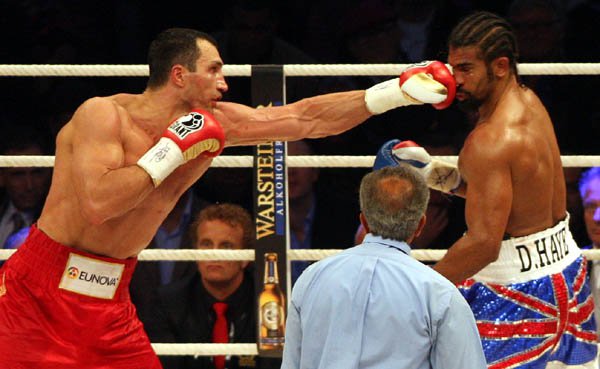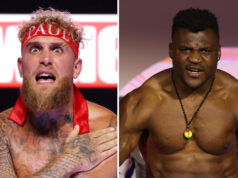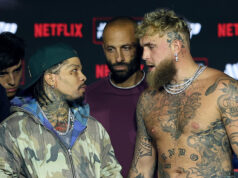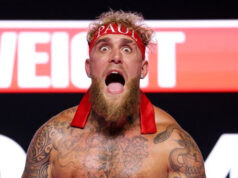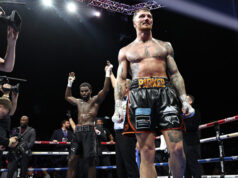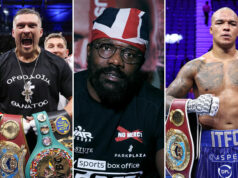Boxing rivalries have been around almost as long as boxing its self. They are an important part of the sport, maybe even essential in building excitement and increasing interest. Some are born out of the desire to capture or retain a title and some stem from two fighters harboring genuine disdain for each other.
Every fight fan likes to see a certain amount of tension and maybe a few crossed words at a weigh-in or pre-fight press conference, but what happens when a boxer goes too far? Does it harm the sport when a fighter’s words and out-of-the-ring actions reverberate further than what they do inside the ropes?
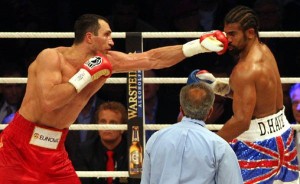
David Haye launched a series of distasteful attacks on Wladimir Klitschko before their massive unification fight. It began with that infamous t-shirt depicting himself holding both brothers’ severed heads aloft and ending with the then W.B.A Champion saying he would visit the Ukrainian in the hospital after the fight.
Wlad was clearly affected by Haye’s remarks, having not encountered that kind of abuse before. He said, “How would your mother like to see a picture with your head off? There are certain things that you can’t cross the line with. You can promote, you can talk garbage and do what you want but there are certain things that you cannot touch.”
Haye lost a lot of fans with his disrespect, while Klitschko gained a new fan base by remaining the consummate professional. Of course, Klitschko was stewing and was focusing on an underlining plan to teach David a lesson during the fight and attempt to change him for the better after it. “My mission in this fight is to show David Haye cannot be cocky in the way that he is and I think that he needs to learn his lesson and the best thing is you can do it in the boxing ring.”
David is of course no stranger to making controversial remarks about fighters. For example, in the press conference before the Audley Harrison fight, he made a comment that the fight will be “As one sided as a gang rape.” That remark (Which David refused to apologize for) not only caused uproar among anti-rape campaigners, but left a sour taste in the mouth of the boxing fraternity. If there is a line David certainly crossed it was there and then.
It’s difficult to see the need in dragging the sport down like that, as David is undoubtedly a charismatic and attractive showman which has helped make him a famous name outside of boxing. If not careful he could land himself with the bad reputation of a disrespectful and argumentative protagonist. Instead of being remembered as an accomplished cruiserweight champion and two-division titleholder, instead it could stain his legacy and force him to be remembered in a bad light.
The Hayemaker isn’t the only British heavyweight to overstep the mark when attempting to sell a fight recently. During the build up to the Tyson Fury and Dereck Chisora contest, Fury upset many in the fight game by saying at a conference call between the two “If it means killing you in the ring, that’s what I’ll do. To beat me you will have to kill me.”
Frank Warren, Chisora’s promoter, immediately filed a complaint to the British boxing Board of Control. His letter read, “It’s totally unacceptable, unprofessional and unprovoked behavior. It did nothing to enhance a British title fight for the sport as a whole. His vile insults and disgusting comments have no place in British boxing.”
Tyson later apologized for his comments but by then the damage had seemed to be done. Chisora announced he would do no more publicity for the fight. Fury is well known for his confident and cocky demeanor, however, implying that your opponents life will end in the ring is vulgar and crass.
There are certain buttons that should never be pushed in any context. This topic has reared its ugly head more than once in boxing history. When one fighter brings race into an argument it opens the door to mainstream criticism and effectively mars a fighter, a fight and even all of boxing for a time. Such attacks are unforgivable and have absolutely no place in sport as a whole.
In 1980 Alan Minter defended his world middleweight title against Marvin Hagler, and the bout was tarnished by a racist slur. When Minter was asked about the fight he stated he wouldn’t let a black man take his title. After 20 years, a fight in which Minter lost in a 3 round bludgeoning at the incensed hands of Hagler, it is still remembered by many for the things Minter said.
Fast forward a generation and a similar insult was thrown by Bernard Hopkins towards Joe Calzaghe when the pair met face to face before their fight with the Executioner repeatedly shouting “I will never let a white boy beat me.” Hopkins as a future hall of famer should never have lowered himself to resorting to such idiotic insults.
Plenty of other examples exist in the long and storied history of boxing. From the reign of Jack Johnson and the Great White Hopes he fought; to the times Muhammad Ali went over the line with his trash talk, such as calling Joe Frazier an Uncle Tom; to the buildup of the Larry Holmes vs. Gerry Cooney bout and on down the line from there.
Boxing would certainly be better without these sorts of stories hitting the press and in a time where the world is doing all it can to kick racism and bigotry of all kinds out of sport, we definitely don’t need any more altercation such as these.
We can only hope that in the future, fighters will engage some brainpower before saying anything they immediately wish to retract, whether it was racial, personal or anything that would be deemed too far. Fighters like James Toney, Ricardo Mayorga and Hopkins have made their names as trash talkers in recent memory, but there’s always a line you shouldn’t cross.
In the words of boxing’s trusted referees… Let’s keep it clean.


